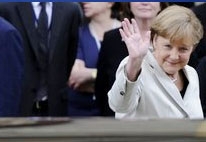IMF urges euro action as Merkel tempers summit expectations
 While senior eurozone finance officials met in Brussels to craft a second Greek bailout for Thursday's summit, Merkel warned against more far-reaching proposals that have been invoked to master the euro's year-long crisis.
While senior eurozone finance officials met in Brussels to craft a second Greek bailout for Thursday's summit, Merkel warned against more far-reaching proposals that have been invoked to master the euro's year-long crisis.
"If you want to act responsibly, you know that such a spectacular step will not happen, including on Thursday," Merkel told a news conference after talks in Hanover, northern Germany, with Russian President Dmitry Medvedev.
The German leader voiced concerns about ideas such as restructuring Greece's debt, creating joint euro-area bonds or forming a transfer union -- a step towards a federal Europe.
Merkel also said governments needed to reduce their debt and improve competitiveness. "Thursday will help in this but further steps will be needed, not one spectacular event solving all problems."
She also spoke by phone with US President Barack Obama, and the White House said the two agreed that "dealing effectively with this crisis is important for sustaining the economic recovery in Europe as well as for the global economy."
After several turbulent days for the euro and European stock markets, the eurozone is racing to agree on a new Greek rescue and prevent the crisis from dragging down bigger nations, with Italy and Spain next in the firing line.
The International Monetary Fund called for urgent action, warning even Europe's strong economies, like Germany and France, were at danger from contagion from a meltdown in struggling Greece, Ireland, Portugal, Italy and Spain.
"Delays in resolving the crisis could be costly for the euro area and the global economy," the IMF said in a detailed report on "spillover" risks for the eurozone.
An IMF spokesman said the body's chief Christine Lagarde will attend Thursday's European summit in her first international appearance as IMF managing director since she took office on July 5.
Previously, she was deeply involved in the eurozone financial crisis, and the first, 110 billion euro ($160 billion) IMF-European Union bailout of Greece, as France's finance minister.
Senior eurozone government officials were to meet again Wednesday in the hope of reaching a deal by Thursday, one year after Greece received that bailout.
Greek Foreign Minister Stavros Lambrinidis said Tuesday the European Union was facing a huge test of its values as it wrestles with its economic woes.
"It is my firm belief that we are at a crossroads in Europe," Lambrinidis said during a visit to Poland, currently at the helm of the 27-nation EU.
Lambrinidis said many European nations were "shutting themselves in shells", looking inwards amid the economic crisis, despite the need to think about the bloc's medium- and long-term future.
Germany, the eurozone's paymaster, Finland and the Netherlands have been at odds with the European Central Bank and other governments over their insistence that private bond holders share the pain in the new rescue package for Greece.
Late on Monday, a special tax on eurozone banks emerged as a potential compromise after governments had struggled for weeks to agree on involving the private sector in the second bailout without triggering a devastating default.
The French and German banking federations voiced concerns about the idea.
The German government's top economic advisors, the "Five Wise Men", have recommended supporting the idea of a partial Greek debt default.
They said "a discount of 50 per cent" on existing Greek state bonds would be desirable, and could reduce Greek debt from some 160 per cent of GDP to 106 per cent, in an opinion piece to appear in Wednesday's Frankfurter Allgemeine Zeitung (FAZ).
They added that whatever it takes, Greece's debt burden has to be reduced, otherwise it will become an increasing burden on its stronger eurozone peers.
EU officials have also mooted a convoluted plan to lend Greece money with which it can buy back its own debt at a reduced price on secondary bond markets, effectively postponing its repayments to give it breathing space.
ECB president Jean-Claude Trichet reiterated his opposition to any deal that would amount to a default, repeating warnings that this would prompt the central bank to cease financing the Greek banking sector.
But an ECB governor, Ewald Nowotny, broke ranks, telling CNBC television that proposals that would trigger a "short-lived selective default" should be studied because it "would not really have major negative consequences."
Merkel has made clear she wants a deal on the table by Thursday after she forced EU president Herman Van Rompuy to cancel plans for a meeting last Friday following a raucous week in the markets.
The German chancellor is expected to meet Wednesday in Berlin with French President Nicolas Sarkozy about the upcoming eurozone summit, the French presidency announced late Tuesday.
What the stars mean:
★ Poor ★ ★ Promising ★★★ Good ★★★★ Very good ★★★★★ Exceptional
Related Contents
Latest News
More News
- Russian President congratulates Vietnamese Party leader during phone talks (January 25, 2026 | 09:58)
- Worldwide congratulations underscore confidence in Vietnam’s 14th Party Congress (January 23, 2026 | 09:02)
- Political parties, organisations, int’l friends send congratulations to 14th National Party Congress (January 22, 2026 | 09:33)
- 14th National Party Congress: Japanese media highlight Vietnam’s growth targets (January 21, 2026 | 09:46)
- 14th National Party Congress: Driving force for Vietnam to continue renewal, innovation, breakthroughs (January 21, 2026 | 09:42)
- Vietnam remains spiritual support for progressive forces: Colombian party leader (January 21, 2026 | 08:00)
- Int'l media provides large coverage of 14th National Party Congress's first working day (January 20, 2026 | 09:09)
- Vietnamese firms win top honours at ASEAN Digital Awards (January 16, 2026 | 16:45)
- ASEAN Digital Ministers' Meeting opens in Hanoi (January 15, 2026 | 15:33)
- ASEAN economies move up the global chip value chain (December 09, 2025 | 13:32)

 Tag:
Tag:




















 Mobile Version
Mobile Version